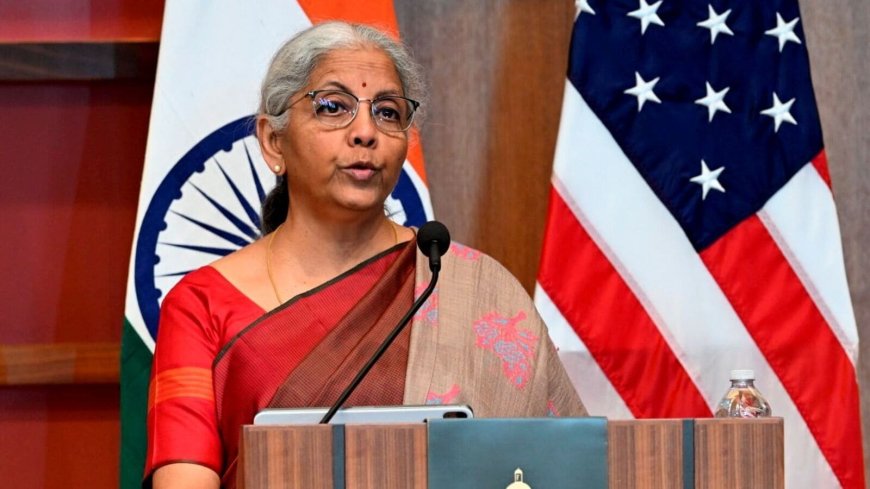Nirmala Sitharaman Urges Vigilance from Banks Amid Escalating Border Tensions
Amid rising tensions along India's borders, Finance Minister Nirmala Sitharaman instructs banks to remain vigilant and ensure uninterrupted services, reinforcing national resilience and economic stability.

Headline
Nirmala Sitharaman Calls for Banking Vigilance as India Faces Border Tensions: Banks Told to Ensure Service Continuity and Security
Introduction
As geopolitical heat simmers along India’s northern frontiers, Union Finance Minister Nirmala Sitharaman has made a critical appeal to public and private sector banks across the country. With military preparedness increasing near the borders, especially in Jammu & Kashmir and Arunachal Pradesh, the finance ministry is simultaneously fortifying the financial system’s readiness. Banks have been instructed to enhance security protocols, ensure 24/7 availability of essential services like ATMs and digital banking, and prevent any disruption in financial transactions.
This isn't just a directive. It’s part of a larger national strategy to ensure economic resilience during times of military uncertainty. And once again, India’s financial backbone — its banking system — is being placed at the forefront of national defense.
Background: Mounting Border Tensions and the Role of Finance
Tensions with neighboring countries, particularly China and Pakistan, have flared in recent weeks due to increased troop mobilization, provocative exchanges at diplomatic levels, and continuous drone intrusions in Jammu & Kashmir. As these tensions escalate, the government anticipates not only military responses but potential disruptions in civic life, communication, and services — with banks being high on the list of critical infrastructure.
Banks, especially in border and conflict-prone zones, often become the first civilian touchpoints during emergencies. Their continuity is vital not only for civilian morale but also for logistics, troop movement salaries, vendor payments, defense procurement, and more.
The Finance Ministry's Directive: Key Points from Sitharaman’s Communication
In a high-level virtual meeting convened with chairpersons of major public sector banks, top private lenders, RBI representatives, and select NBFCs, Sitharaman stressed the following:
-
Uninterrupted Banking Access: ATMs, UPI services, online banking, and branch operations in border districts must function without interruptions.
-
Security Reinforcement: Local law enforcement has been asked to coordinate with banks to increase physical security at branches and ATMs, especially in sensitive locations.
-
Contingency Planning: Banks must be prepared with alternate power sources, backup servers, offline transaction kits, and rapid-response teams for any physical or cyber sabotage.
-
Support for Defense Accounts: Defense personnel and related services must get priority for account management, salary disbursals, and financial clearances.
-
Mobile Banking Vans in Remote Areas: To reach displaced communities or those affected by troop deployment, mobile banking services have been suggested.
Ground Reality: How Banks Are Responding
Leading banks have already taken action. Here's what the current response looks like:
State Bank of India (SBI):
India’s largest public sector bank has activated its business continuity plans (BCP) in over 42 border area branches, including the Ladakh and Kashmir sectors. Generator support and satellite backup systems are being tested for deployment.
HDFC Bank:
The private lender is reportedly working closely with local administration in Assam and Arunachal to ensure all digital and ATM systems stay online. They’ve increased surveillance at ATM kiosks in border towns.
Punjab National Bank (PNB):
PNB has deployed 6 mobile banking vans in Jammu and plans 4 more across sensitive zones in Arunachal Pradesh. These are fitted with biometric verification systems and satellite connectivity.
Axis Bank and ICICI Bank:
Both are evaluating temporary service booths and war-room-like monitoring for digital banking threats.
Cybersecurity: The Invisible Frontline
Apart from physical threats, Sitharaman has raised alarms on the digital front too. With cyber warfare now a standard tool in international conflicts, India’s banks are prime targets.
The Reserve Bank of India (RBI) has asked banks to:
-
Conduct immediate security audits
-
Activate AI-based anomaly detection systems for UPI frauds
-
Install endpoint security at all branch terminals
-
Coordinate with CERT-IN (Computer Emergency Response Team – India)
India’s cybersecurity command within the Ministry of Electronics and IT is already working in tandem with banks to monitor suspicious data flows from border regions and potentially hostile foreign networks.
ATM Dry Runs and Service Simulation in Conflict Zones
The finance ministry, in association with the National Payments Corporation of India (NPCI), is conducting dry runs in critical zones. These involve:
-
Simulating power outages and ATM downtime
-
Testing mobile data fallback protocols
-
Training local staff to operate under duress
-
Ensuring digital transactions can function offline for essential services (fuel, food, transport)
Industry Voices: What Experts Say
Arundhati Bhattacharya, former SBI Chairperson:
"Banks today are not just financial institutions; they are crisis managers. Ensuring operational continuity during military or civic emergencies is part of the new banking mandate."
Nilesh Shah, MD at Kotak AMC:
"Finance is the backbone of any defense response. Troop salaries, logistics, supply chains — everything runs through the banking system. Sitharaman's foresight is commendable."
Lt Gen (Retd) Syed Ata Hasnain:
"Banks working in border zones are unsung heroes. Just like the army, they too face the enemy — albeit in the form of system threats, physical risk, or economic sabotage."
The Bigger Picture: Banking in a National Security Framework
India's strategy now blends defense with economy — no longer treating them as separate silos. The current situation is a clear example of integrated governance.
The Finance Ministry, Ministry of Defence, Home Affairs, RBI, NPCI, and IT Ministry are all coordinating on one battlefield: national resilience.
In the post-COVID and high-conflict world order, economic stability has become a key indicator of national strength. This directive marks the shift from reactive to proactive defense finance.
What Lies Ahead?
As long as the troop build-up continues and intelligence inputs warn of possible escalations, banking institutions must remain on high alert. Sitharaman’s office is expected to conduct weekly reviews via video conferences.
RBI may also release updated guidelines soon for financial operations in conflict-prone areas, including a new circular on "Essential Financial Services Under Hostile Conditions."
A parliamentary committee on economic resilience in border zones is also being proposed.
A Nation on Guard, Financially and Militarily
India is preparing on every front — soldiers on the borders, bureaucrats in Delhi, and bankers in both. Nirmala Sitharaman’s latest instructions aren’t just about banking operations; they’re a signal of how modern warfare now demands economic continuity as much as military readiness.
With vigilant banks and a resilient financial backbone, India is making sure that in times of uncertainty, its citizens don’t lose access to the very lifelines that keep livelihoods going — savings, salaries, and security.
What's Your Reaction?
 Like
0
Like
0
 Dislike
0
Dislike
0
 Love
0
Love
0
 Funny
0
Funny
0
 Angry
0
Angry
0
 Sad
0
Sad
0
 Wow
0
Wow
0












































































